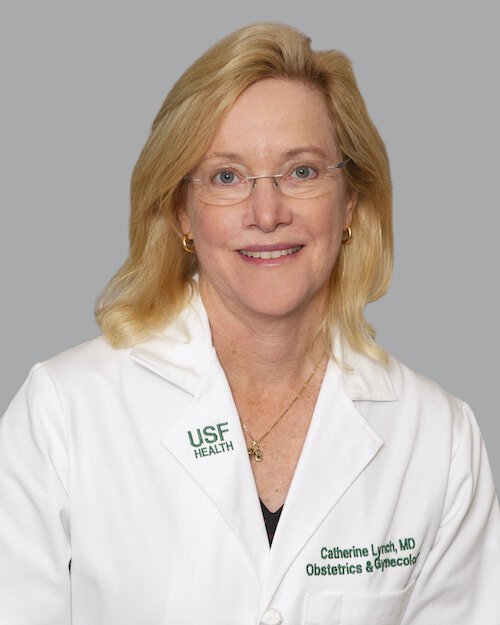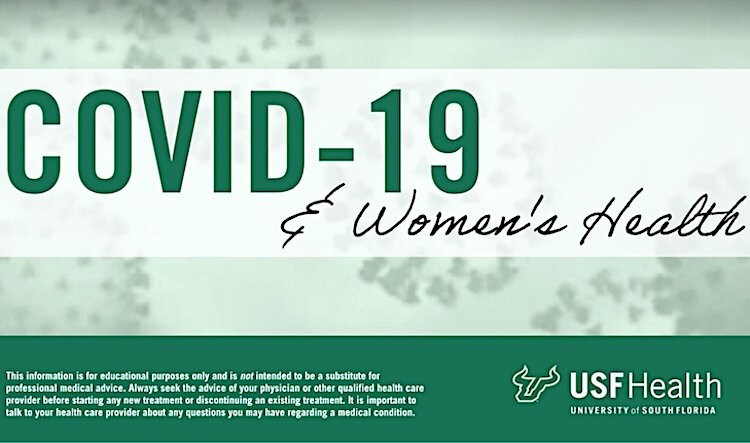USF Health experts provide answers to COVID-19 questions
The CDC released an urgent Health Advisory on Sept. 29 urging COVID-19 vaccinations among all pregnant women. The announcement came the same day as a USF Health-sponsored panel of experts met to address questions about COVID-19 and Women’s Health.
If you’re pregnant or a parent and still having doubts about getting the COVID-19 vaccine, advice from a panel of medical and scientific experts from the USF Colleges of Public Health, Medicine, Pharmacy, and Nursing may help alleviate your concerns.
Convening on Sept. 29, the same day the CDC released an urgent Health Advisory for pregnant women to get vaccinated, the University of South Florida panelists spoke with Moderator Dean Donna Petersen of the College of Public Health in a virtual gathering with clear messages and recommendations.

“More studies on the COVID-19 vaccines have been done than on many other medications that have been used for years,” said Dr. Catherine Lynch, Professor of Obstetrics and Gynecology at the USF Morsani College of Medicine in Tampa, in her opening remarks.
In referencing WHO (World Health Organization) statistics showing 217 million cases of COVID-19 and 4.5 million deaths globally — so far, Lynch added that the resulting research “has provided a new vaccine, a new preventive medication with 5 billion doses having now been given worldwide.”
The statistics, she reiterated, show that COVID-19 causes serious illness in 13% of people infected, critical illness in 5%, and death in 2-3%.
What is not fully understood is the impact of “long COVID-19,” in which flu-like symptoms, fatigue, and “brain fog” persist beyond four weeks of initial symptoms, sometimes lasting for months, or potentially even years.
A report released just this week indicates that up to one-third of COVID-19 patients develop “long-COVID-19,” the risk for which can be unrelated to disease severity. Lynch stressed “this is one reason why it’s important to get the vaccine and not rely upon herd immunity.”
The USF Health virtual panelists offered prepared remarks and addressed a number of audience questions.
Here is a summary, including 10 takeaways and topics from the panel’s responses.
COVID-19 vaccines and safety
Dr. Kevin Sneed, Dean of the USF College of Pharmacy emphasized that “vaccine

safety has increased immensely with extensive testing going back to 2000 in clinical trials of m-RNA vaccines like the ones used with Pfizer and Moderna. He noted that “we are very comfortable with all of the four available COVID-19 vaccines.” While mild side effects like shoulder discomfort and fatigue are common and usually last no more than 24-48 hours, he added “serious side effects [from the vaccine] are extremely rare.”
As for the myth that m-RNA somehow affects genes, Dr. Sneed explained that the COVID-19 vaccine directs the production of proteins inside a cell without ever entering the cell’s nucleus where genes and DNA are housed. The panelists agreed that all of the currently available vaccinations are highly effective in preventing severe disease, hospitalization, and death — all potential outcomes of being unvaccinated and getting the disease itself.
Should people who have already had COVID get vaccinated?
The panelists agreed that “natural” or “passive” immunity as a result of having COVID-19 does NOT provide the same protection as vaccination because the body’s response to infection — production of antibodies — varies from person to person. Vaccination is recommended. Some research also shows vaccines provide greater protection against “long-COVID” compared to “natural” immunity from the infection. The panelists agreed that vaccination is highly effective in preventing severe disease, hospitalization and death.
How does COVID-19 affect pregnant women?

Dr. Judette Louis, Chair of the Department of Obstetrics and Gynecology at USF Health, noted that COVID-19 puts pregnant patients into a high-risk category. She cautioned that these risks mean more preterm births, more likely admission to the ICU, and a 70% greater risk of death. Unfortunately, she added, only 31% of U.S. pregnant patients are now vaccinated — meaning that the 69% who are unvaccinated are choosing too put themselves and their babies at much higher risk.
Should pregnant women get a COVID-19 vaccination?
The CDC now recommends vaccination for “any American who is pregnant, planning to become pregnant, or currently breastfeeding.”
The CDC’s Urgent Advisory came after recent statistics revealed more than 22,000 hospitalizations and 161 maternal deaths among U.S. pregnant patients with COVID-19.
In addition to this Advisory, 18 national organizations including the American College of Obstetricians and Gynecologists and the American Academy of Pediatrics signed a joint Consensus Statement urging vaccination among all pregnant women. Panelists noted that the vaccine can be given any time during pregnancy and is not limited by trimester.
How does a COVID-19 vaccination affect a fetus/ the unborn?
Antibodies created by a vaccinated pregnant woman are transferred to her baby and to breast milk, creating protection to the baby for at least six months.
Ongoing studies are evaluating the duration of protection beyond this time. Patients with COVID-19, per CDC guidelines, are not restricted from breastfeeding although precautions include masking while breast-feeding and hand-washing before and after breast-feeding.
What about the risks of COVID-19 in children?
In the most recent and 4th wave of the pandemic — characterized by the rapid spread of the Delta variant this past summer — a spike in COVID-19 infections was seen among children and teens. Although the risk of severe disease in people under age 18 is less than in adults (and symptoms are usually milder), a report from the United Kingdom Office of National Statistics found 10% of children developed “long- COVID,” lasting for several months and potentially longer. Their symptoms were similar to those of adults including joint pain, muscle aches, “brain fog,” and fatigue. Long-COVID remains an enigma for which a specific test or treatment remains allusive.
To prevent COVID-19 outbreaks in schools, the CDC recommends that children — as well as adults — adhere to mitigation strategies including universal indoor masking and physical distancing.
Should children and teens get the COVID-19 vaccine?
Dr. Claudia Espinosa, an infectious disease specialist in the Department of Pediatrics,

stressed that delaying vaccination in children over 12 is not advisable.
“We thought at the beginning of the pandemic that children would be spared,” she said, but with so many children infected in recent months, she expressed concern about long-term effects, noting “you don’t have to be one of those sicker patients to have one of those (“long-Covid”) manifestations.”
Just as adults, “these kids have decreased attention, brain fog, and fatigue that is hard to manage because we really don’t have treatment for it,” she added.
Regarding widely publicized but rare cases of vaccination-related myocarditis, the risk is many times greater for having myocarditis due to COVID-19 itself. Vaccinating children also protects the community as asymptomatic children, like asymptomatic adults, can spread the disease.Vaccines for children between 5 and 11 years are expected to become available soon.
Does the COViD-19 vaccine cause infertility?
No. Infertility is not an issue, according to the USF panel. Nor is there a greater risk of miscarriage, according to data tracking vaccinated patients who were undergoing infertility treatments and subsequently became pregnant.
Does the COVID-19 vaccine change a woman’s menstrual cycle?
Dr. Lynch commented that “we know that strong immune responses from a variety of things can affect menstrual cycle regularity.” While vaccination may impact menstruation in the month the shot is given, any long-term consequences haven’t been thoroughly studied yet. However, she said, “there is good news on this front due to a study at Boston University evaluating 1,800 women and their cycles since 2013 and they’re now going to take a look at this variable” to see what, if any, menstrual cycle changes do occur as a consequence of the vaccination.
Is a third dose of the COVID-19 vaccine the same as a booster?
The panel made a distinction between a “third dose” and a “booster.”
A third dose refers to an indicated extra dose of the Pfizer or Moderna vaccine for a very specific population of immunocompromised individuals such as those having had an organ transplant.
A Pfizer booster, on the other hand, refers to a 3rd shot given to those 6 months or more out from having received the second dose of this vaccine and is intended for several “at risk” conditions including pregnancy and being over age 65.
The Pfizer booster is already available; the Moderna booster will be approved soon and, according to Dr. Sneed, may very possibly be recommended as a half-dose.
Just this week, Dr. Sneed noted, the FDA began to review new data that will attempt to answer the question of whether some combination of mixing and matching different vaccines as boosters will improve the immune response.
Overall, on all things COVID-19, the message was clear: Stay tuned for the next chapter in the evolving COVID-19 story. As more time passes, more research will occur, and more answers will be known.
To learn more, visit USF Health and USF COVID-19 Resources & Updates.















